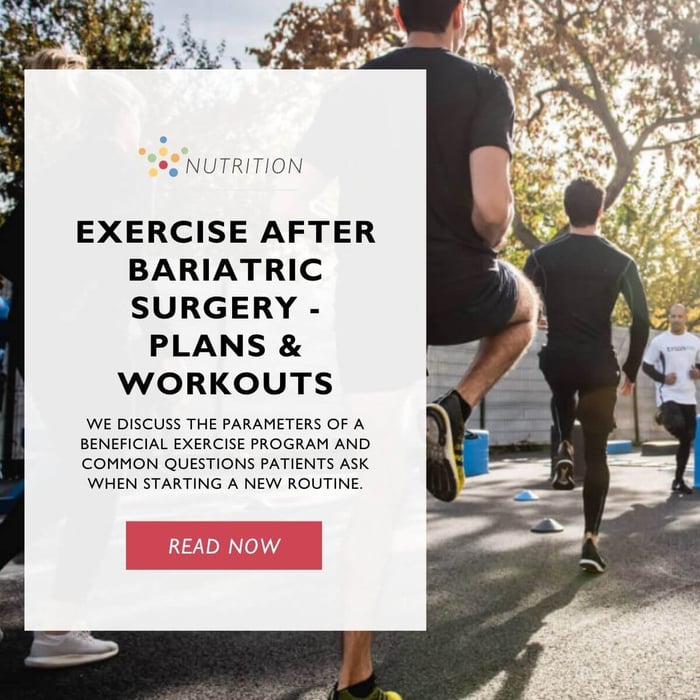Tips to Reduce Vomiting and Nausea After Bariatric Surgery
Lifestyle
February 20th, 2023
We've all heard that some nausea and vomiting may be common following your bariatric surgery (such as gastric sleeve surgery), considering it affects nearly 2/3 of all bariatric patients1. Not only is it a patient discomfort, but it typically increases your length of stay in the hospital2. Factors such as female gender, history of motion sickness, and non-smoking status may make you more susceptible to experiencing post-op nausea and vomiting2.
However, there are some things you can do to lessen these side effects. Here we will review some helpful tips to make the transition to life after surgery a little easier for you.
SURGERY
Anesthesia and surgery itself may cause nausea. It's important to remember that this is one of the "normal" side effects of having bariatric surgery. However, we all know there are many things that can contribute to nausea and/or vomiting.
PACE OF EATING
Remember to eat slowly to reduce nausea and/or vomiting following bariatric surgery (WLS). Some surgeons recommend trying to take 30 minutes to eat your meal.
However, we all know this all depends on what you're eating and how far you're out from your surgery. Some patients may even eat with baby silverware to slow down their pace of eating and remind them to eat slower.
One of the best tricks to eating slower is to not allow yourself to get too hungry. Stay in tune with your hunger cues and don’t go too long without eating. Allowing yourself to reach a point of feeling “starved” will make you naturally eat faster, and before you know it your meal is down in 5 minutes. Be sure you feed yourself before you reach this point.
CHEWING FOOD
Proper chewing helps you slow down when eating. Some programs recommend chewing each bite of solid food 30 times or to an applesauce consistency.
Slowing down when eating helps for two reasons: 1) helps the brain realize how full the stomach is, preventing overeating and 2) helps prevent food from getting stuck.
FOOD INTOLERANCES
Please remember that you have to re-learn what works for you and which foods are well tolerated and when they'll be tolerated after bariatric surgery (and that each day may be different). Re-introducing foods one at a time can be an easy way to determine which foods you are having difficulties with.
If several foods are introduced at once and the meal was not tolerated, the exact food causing the intolerance is not determined. However If only one new food item is introduced, and the meal is not tolerated, it is clear that the new food is the cause of the intolerance3.
FULLNESS/OVEREATING
Almost every post-op WLS patient can share an experience when just one bite too much caused him or her to get sick. You have to re-learn not only what foods you can eat, but how much.
Keep in mind if you can eat 4 bites of Greek yogurt, this does not necessarily mean you can eat 4 bites of grilled chicken breast. The more solid/dense a protein (chicken breast for example) is, it’s likely you won’t be able to eat as much as the softer proteins (Greek yogurt for example) before feeling full.
Overeating, emotional eating, and mindless eating are all habits that have been found to be a real struggle for post-bariatric individuals1. If you fall under any of these categories consider utilizing cognitive behavioral therapy, as this has been found to be beneficial1. This therapy emphasizes the utilization of simple tasks such as going on a walk whenever urges to snack or binge arise1. It also considers simple problem solving, rational thinking, and social support as a means for avoiding emotional eating and overeating1.
FOOD STUCK
As mentioned above, chewing will help to ensure that food doesn’t get stuck, because this can be a common cause of vomiting. Simple physics – if a food is not going down, it has to go somewhere, so it’s going to come back up most likely. Not only is your stomach smaller, but for most patients the esophagus feels tighter too. This makes chewing so much more important than it was prior to weight loss surgery. You have to be kind and gentle to your “new baby stomach.”
DRINKING
Certainly it’s important to stay well-hydrated following WLS, but some patients report vomiting if they drink too closely following a meal as that will make them feel too full and may make them vomit. Some programs recommend waiting 30-60 minutes after eating to drink fluids. Another concern with drinking fluids is the amount and the pace. Just as eating too fast may induce vomiting, drinking fluids too fast or too much may do the same thing. Remember to drink slowly and try to get used to your new feeling of fullness.
LYING DOWN TOO QUICKLY
Not only does lying down too quickly following a meal increase your chances of heartburn (acid reflux), but it may also increase your risk of nausea and/or vomiting. You should wait 30-60 minutes after eating to lie down. This can be prevented by simply planning out your meals and not eating before bed. Organize your meal times around your social/work life so that you are consuming the calories you need, but not doing so right before you go to sleep.
ADVANCING STAGES TOO QUICKLY
Most programs have diet stages that they recommend you follow after your weight loss surgery. These stages will vary from program to program, but in general may go from liquids to pureed (applesauce consistency), to soft, and finally regular. These diet stages are important because it allows your stomach to heal properly and also helps reduce the nausea and vomiting that may be common following bariatric surgery. If you consume solid food too soon and aren’t following your surgeon’s plan, you may find yourself getting sick or increasing your risk of surgical complications.
TAKING VITAMINS WITHOUT FOOD
Some patients have no problems taking vitamins, but there’s a subset of patients that must take their bariatric vitamins with food to reduce the nausea that vitamins and/or minerals may cause. Every person responds differently to this and you have to determine what works for you. With this said though, keep in mind, immediately following WLS you may not be eating enough to counteract the nausea. Or you may feel full just from taking your chewable vitamins and aren’t able to combine them with your meal. If you cannot combine them with your meal, try taking them later in the day as opposed to first thing in the morning. Having a little something in your stomach prior to taking them can help with the nausea/vomiting.
CHEWABLE VITAMINS VS. LIQUID VITAMINS
Most patients do fine starting on bariatric chewable vitamins, however, there is a small percentage that don’t tolerate chewable vitamins immediately following weight loss surgery. If you find that you’re one of these patients, you may want to try liquid vitamins (such as our Celebrate Essential Multi 3-in-1 Multivitamin with Calcium Drink Mix or Celebrate Essential Multi 4-in-1 Multivitamin Protein Shake). By taking a liquid vitamin you’re taking this vitamin over a period of 15-30 minutes and lowering the dose that’s hitting the bloodstream immediately, thereby reducing the risk of nausea.
IS IT DUMPING SYNDROME?
Gastric bypass patients may experience dumping syndrome and eating foods or meals high in sugar or fat is what may cause the dumping syndrome. Is your nausea or vomiting combined with an increase in heart rate? Do you have any abdominal pain or cramps? Do you feel dizzy or light-headed? Do you have any diarrhea? These are some of the common symptoms associated with dumping syndrome, however, patients may respond differently to dumping syndrome. So what exactly is dumping syndrome? It’s your stomach’s response to large amounts of food/liquids in the small intestine3. One way to avoid dumping syndrome is to work to keep fat less than 10 grams per serving, or less than 30% of total calories. Avoid fried foods or fatty meats and sauces like sausage, hot dogs, and mayonnaise3. Keep sugar less than 10 grams per serving and avoid high sugar drinks like Kool Aid or Gatorade3.There are even some bariatric surgery patients that have had to lower those numbers to less than 5 or 6 grams per serving. So, keep in mind that not all patients are the same and you have to figure out what works for you.
GINGER
It’s theorized by some that ginger may reduce nausea. Some patients swear by it, so it may be worth mentioning. The research on ginger produces mixed results. Please talk to your doctor before starting any new supplements as there may be interactions with other medications or it may not be safe for you to take certain supplements. Also, keep in mind, as with anything, more is not always better. Most importantly, talk to your physician.
Vitamin B6
Vitamin B6 has been found to help nausea and vomiting in pregnant women4. Similar to ginger, some post-op bariatric patients have also found some luck in reducing their own nausea with vitamin B6. Although there is not clear research on whether or not vitamin B6 is beneficial to post-op bariatric patients, it may be worth trying out. Just be sure to follow the DRI, and always consult with your physician before trying new supplements.
ULCERS
Some patients may develop an ulcer at the new connection between the stomach and small intestine (gastric bypass or biliopancreatic diversion with duodenal switch) and this may cause nausea and/or vomiting. Smoking, taking aspirin, ibuprofen, and H. Pylori (a bacteria in the stomach) may increase your risk of ulcers.
STRICTURE
Another cause of nausea and/or vomiting following gastric bypass surgery may be a stricture. A stricture is when the new connection between the stomach and small intestine heal and scar tissue forms making the opening of this new connection smaller than your bariatric surgeon intended.
OBSTRUCTION
Another cause of nausea and vomiting is an intestinal obstruction. Any abdominal surgery may result in scarring in the abdominal cavity, called adhesions. The small intestine can become twisted from the adhesion and cause a blockage (or obstruction), but this is rare. This can occur even years after surgery. The latter are all something that would need to be diagnosed by your surgeon. Most surgeons tell their patients to call the office if they are nauseous and/or vomiting a certain amount of times per day or for a certain number of days. The best recommendation is to talk to your surgeon if you have any concerns or are not feeling well.
We hope this helps provide a few tips on reducing nausea and vomiting following bariatric surgery. Please keep in mind this is not intended to serve as medical advice. Please contact your physician with your specific concerns and/or questions. If you are a new post-op patient, we look forward to hearing about your successes. If you had your surgery quite some time ago, we look forward to you sharing with the newbies what worked for you!

1. Anderson, L. M., & Chacko, T. P. “Bariatric outcomes: Self-management for sustained surgical success: A multicomponent treatment for dysregulated overeating in bariatric surgery patients." Journal of Addictions Nursing, vol 29, no.1, 2018, pp. 32-42.
2. Suh, Sarah, et al. “The impact of nausea on post-operative outcomes in bariatric surgery patients.” Journal of surgical endoscopy, vol 34, 2019, pp 3085-3091., doi:10.1007/s00464-019-07058-5.
3. Mahan, K., & Raymond, J. L. (2017). Nutrition and Bone Health In Kraus's Food & The Nutrition Care Process (14th ed., pp. 480-500). Essay, Elsevier Inc.
4. Sahakian V, et al.. “Vitamin B6 is effective therapy for nausea and vomiting of pregnancy: a randomized, double-blind placebo-controlled study.” Obstet Gynecol, vol 78, no. 1, 1991, pp 33-36.
$19.99
Maximizing nutrient absorption is essential for long-term success after weight loss surgery. Bariatric Multivitamin capsules offer a comprehensive blend of vitamins and minerals, meticulously formulated to optimize absorption even with a reduced digestive system. Thorough range of essential nutrients crucial… read moreBariatric Multivitamin Capsules, Iron-Free










